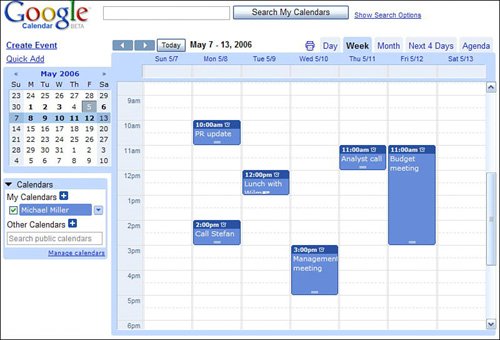All About Google CalendarGoogle Calendar (calendar.google.com), shown in Figure 33.1, looks like every other web-based calendar you've ever seen. (And like most software-based calendars, too.) You enter your appointments (which Google calls "events") directly into the calendar, which you can display in either daily, weekly, or monthly views. You can also, if you like, view your weekly agenda on a single page. Figure 33.1. Google Calendarnot just another calendar application.
Nothing unusual about any of that. So, compared to all the other calendar applications out there, what's unique about Google Calendar? First, Google Calendar is a web-based calendar. This means that your calendar information is stored on Google's servers, not on your own computer. The advantage of this is that you can access your calendar from any computer anywhere in the world. Just log onto the Google Calendar page, and your calendar and all events are there. Second, since Google Calendar is web-based, you can use it to create not only a private calendar for yourself, but also public calendars for your company or organization. Create a public calendar and all employees or attendees can access it via the Web. In addition, special event invitation features make it easy to invite others to an eventpublic or private. Third, Google allows you create several differentand different types ofcalendars. You can create one calendar for home, another for work, and yet another for your son's soccer team. Then you can view all your calendars from the same Google Calendar page. Fourth, since Google Calendar is part of the Google empire, it integrates smoothly with Gmail. Google Calendar can scan your email messages for dates and times and, with a few clicks of your mouse, create events based on the content of your Gmail messages. Finally, Google Calendar tries to be as universal as possible. That means relatively seamless integration with the information you've previously created with any other calendar programs you may be using, such as Yahoo! Calendar or the Microsoft Outlook calendar. Note While Google Calendar imports events and appointments from Microsoft Outlook, it doesn't (as yet) offer dynamic synchronization with Outlook. That means you can't make a change in Google Calendar and have it reflected in Outlook, or vice versa. Google is purportedly working to add this feature at a later date. Bottom line, Google wants to make it both beneficial and easy to move from your current calendar program to Google Calendar. Give it a try and see what you think. |